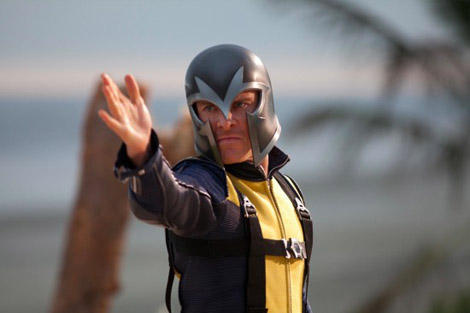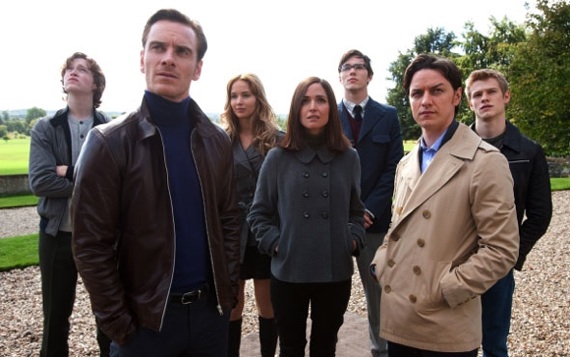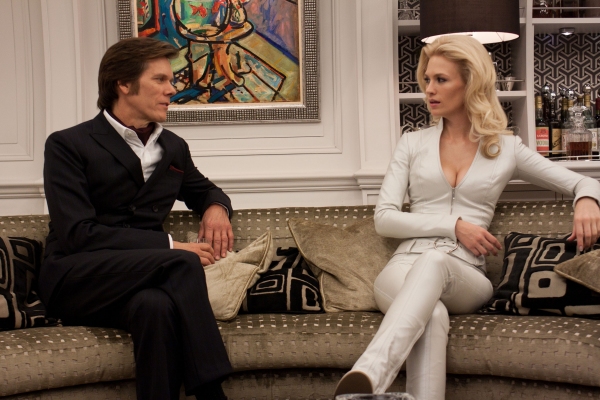Thu 2 Jun 2011
Head of the Class
Posted by Ethan under Film Review, NYC Film Critic
Comments Off on Head of the Class
X-Men: First Class
Directed by Matthew Vaughn
Screenplay by Ashley Miller, Zack Stentz, Jane Goldman, Matthew Vaughn
Starring James McAvoy, Michael Fassbender, Kevin Bacon, January Jones, Jennifer Lawrence
***
Fifth in production order but technically second in terms of continuity, X-Men: First Class, the latest feature starring Marvel Comics’ not-so-merry band of mutants, acts as a prequel to the first three X-pictures while running vaguely parallel to that Wolverine movie that stunk up theaters two summers ago.
Taking place predominantly in the early ‘60s right around the time of the Cuban Missile Crisis, the movie depicts the first outing by Charles “Professor X†Xavier (James McAvoy, taking over a role originated by Patrick Stewart) and his original crew of X-Men, which then included his friend-turned-eventual-nemesis Erik “Magneto†Lehnsherr (Michael Fassbender, in for Ian McKellen). The novice team is on the trail of Sebastian Shaw (Kevin Bacon, hamming it up just a tad too much), a powerful mutant who intends to spark a nuclear conflict between the U.S. and Russia. Shaw is also the man that killed Erik’s mother before his eyes during World War II, when the Lehnsherr family was forced into a concentration camp where the boy’s magnetic powers first manifested themselves. (It’s worth noting that the opening scene of First Class is a re-shot and expanded version of the brief prologue seen at the top of the original X-Men outing.) In fact, Erik has only joined Xavier’s X-periment as a means to finally get his revenge on his mother’s murderer, but Charles keeps hoping he’ll be able to win him over to his more tolerant way of thinking, promising the hotheaded young man that man and mutant will be able to find a way to live alongside each other.
Released in 2000, the first X-Men adventure (directed by Bryan Singer, who produced—and was originally attached to helm—First Class) can be credited with kick-starting the current comic-book movie craze and establishing Marvel as a cinematic force to be reckoned with after years of sub-par attempts at translating their heroes to the big screen. (Just try watching the never-officially-released Roger Corman-produced Fantastic Four movie or 1990’s DOA Captain America flick if you dare.) Seen today, it still mostly works, thanks largely to Hugh Jackman’s star-making performance as Wolverine, McKellen and Stewart’s bemused turns as the Malcolm X and Martin Luther King Jr. of mutant-kind respectively and a straightforward, economical narrative. In fact, X-Men clocks in at a swift 94 minutes, which is almost unheard of these days when studios lavish upwards of two hours on movies about a dude that dresses up in a bat suit or a Norse God who swings a really big hammer.
Still, Singer’s inexperience with big-budget blockbuster filmmaking, as well as behind-the-scenes studio meddling, does occasionally shine through, most notably in the action sequences, which feature choppy choreography and iffy special effects. The sequel, X2: X-Men United, is a more confident piece of direction, but it’s not necessarily a better movie overall. After a killer opening set-piece in the White House, followed by an equally effective assault on the X-mansion, the film’s energy flags as it struggles to keep track of its various pockets of characters until they all reconvene for the final showdown. While I’m not one of those folks that consider the third installment, X-Men: The Last Stand, to be an abomination, it’s a compromised movie that clearly suffers from a rushed production schedule and the lack of a finished screenplay. It’s bad, but it’s not that bad. (Most folks tend to blame incoming director Brett Ratner—who took over the project when Singer jumped ship to make Superman Returns—for the movie’s problems, but I personally think he just shot the script he was handed. Ratner’s chief skill as a director is delivering glossy, professional-looking studio product and that more or less describes The Last Stand, which does boast some of the franchise’s best action sequences. But he can’t elevate or fix material that’s just not working on the page.) As previously indicated though, X-Men Origins: Wolverine really is that bad, a shoddy, cheap-looking, borderline incoherent solo adventure for the most popular X-Man that even its star now seems vaguely embarrassed by. How else to explain Jackman’s thwarted attempts to recruit Darren Aronofsky to make another Wolverine adventure that he specifically promised would have almost nothing to do with its predecessor?
Given the uneven nature of the series, calling X-Men: First Class one of the stronger X-Men movies to date is kind of damning it with faint praise. But overall this is a solid, sturdy comic-book movie that combines X2’s showmanship with the first X-Men’s strong narrative throughline. However, it also would have greatly benefitted from the original’s brevity; First Class could easily stand to lose at least 20 minutes from its ungainly 130-minute runtime, especially in the exposition-heavy first half, which labors to get all the players on the chessboard and then bring them into contact with each other. According to some reports, a fair amount of Magneto’s storyline was actually appropriated from a separate solo project that Fox had been developing for the master of magnetism. Indeed, that material—from the character’s obsession with Shaw to his tenuous friendship with Xavier—often feels distinctly separate from the movie’s other major narrative thread, which involves Charles’ attempts to recruit and train a group of teenage mutants, among them sonic screamer Banshee (Caleb Landry Jones), fairy-winged Angel (Zoe Kravitz), easily adaptable Darwin (Edi Gathegi) and energy blaster Havok (Lucas Till). Rounding out the pupils in Professor X’s first class are scientist Hank McCoy a.k.a. Beast (Nicholas Hoult) and Charles’ childhood friend Raven (Jennifer Lawrence), the blue shape-shifter otherwise known as Mystique.
It’s not entirely these young actors’ fault that their characters come across as afterthoughts to the far more interesting Erik/Charles relationship. Most of them are entirely personable—with the exception of Kravitz and Till, who are so wooden they could give you splinters—and in Lawrence’s case, she turns what was a throwaway role in the original trilogy into a heroine with a beating heart. (I guess I should mention that Shaw has his own team of mutant warriors as well, but the only memorable member of that crew is January Jones’ Emma Frost and that’s more for her cleavage-baring outfits rather than any distinguishable personality.) But one always gets the sense that director Matthew Vaughn would much rather keep the camera on McAvoy and, in particular, Fassbender, whose effortlessly charismatic performance will likely award him the major career boost that Hugh Jackman received following the first X-Men. Granted, Fassbender isn’t exactly an unknown, having appeared in lots of acclaimed art-house fare from Hunger to Fish Tank to Jane Eyre. Still, this is his first exposure to a mass audience and I have a feeling they’ll like what they see.
Perhaps what I appreciated the most about First Class is that it builds its set-pieces into its narrative, as opposed to structuring its narrative around a series of set-pieces. Too many blockbusters opt to go the latter route, which typically results in a movie that plays more like an improv sketch, with everyone involved making it up as they along. Even in its clunkiest, most artificially contrived moments I always felt that Vaughn knew where the narrative was going and had a firm grasp on the movie’s tone. That said, I do wish he possessed a stronger visual sensibility; much like his previous comic book-inspired features Kick-Ass and Stardust, First Class looks disappointingly generic both in terms of its production design and camerawork. The trappings of the ‘60s are present in the frame—hair, clothes, props etc.—but the film fails to capture the feel of the time period in the same way a show like Mad Men does on a significantly smaller budget. The locations all run together as well—oftentimes it seems as though the entire movie is taking place on the same soundstage. And like Ratner before him, Vaughn had to deal with an accelerated production schedule on the film, which may explain why the CGI-enhanced F/X are noticeably uneven, particularly in the climactic battle where you can almost spot the wire frames on a few key effects. Still, in a summer movie season that has so far lacked a piece of big-budget studio fare that successfully marries spectacle and story, X-Men: First Class is probably the cream of the current blockbuster crop. At least, potentially, until Super 8 arrives next week…  Â
X-Men: First Class opens in theaters on Friday.
Also in Theaters:
Empire of Silver
Directed by Christina Yao
Written by Christina Yao and Cheng Yi
Starring Aaron Kwok, Tie Lin Zhang, Hao Lei, Jennifer Tilly
**1/2
Here’s something we don’t see often enough on these shores: a Chinese period piece that doesn’t involve elaborate martial arts sequence. Instead, Empire of Silver, co-written and directed by Christina Yao from a book by Cheng Yi, models itself after such celebrated—and, within China anyway, controversial—dramas as Zhang Yimou’s Raise the Red Lantern and Chen Kaige’s 1993 Palme d’Or winner Farewell My Concubine. Set at the turn of the 20th century against the backdrop of the Boxer Rebellion, the movie attempts to combine Concubine’s epic historical sweep with Lantern’s juicy depiction of the backroom dealings of a powerful family. In this case, the family in question runs one of the nation’s most prominent banks, where the wealthy have stored their silver for generations.  The institution is currently in the firm grasp of Lord Kang (Tie Lin Zhang), who is desperately in need of an heir to ensure the continuation of the family business. When his other offspring prove wanting, he forces his third son (Aaron Kwok) to take control; but there’s a catch—the guy is still furious with his old man for claiming his first flame (Hao Lei) as a wife. As China teeters on the brink of chaos, Third Master struggles to control his feelings for his lover/stepmother and pursues a risky new business model—one his father strenuously objects to—by opening the bank’s vaults to the poor as well as the rich. Handsomely mounted and packed with interesting historical details, Empire of Silver unfortunately falls short on providing emotionally rich drama, particularly when compared to the films it’s using as models. The central love story lacks the necessary fireworks and Kang and Third Master’s power struggle proves equally dry. For too much of Empire of Silver, I found myself more interested in the workings of this institution—as well as China’s financial system circa 1900—rather than the people running it. That’s fine for a documentary, but problematic for a fictional drama





No Responses to “ Head of the Class ”
Sorry, comments for this entry are closed at this time.